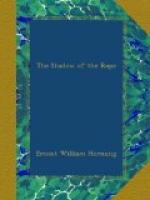“I’ll teach you!” cried Morna at once. “What fun it will be!”
“I should enjoy it, I know. But—”
The sentence was abandoned—as was often the case in the subsequent intercourse between Rachel Steel and Morna Woodgate. From the beginning, Rachel was apt to be more off her guard with Morna than with any one whom she had met during the last six months; and, from the beginning, she was continually remembering and stopping herself in a manner that would have irritated Morna in anybody else. But then—yet again, from the beginning—these two were natural and immediate friends.
“You must learn,” urged Morna, when she had waited some time for the sentence which had but begun. “There are people who scorn it—or pretend to—but I am sure you are not one. It may not be the finest form of exercise, but wait till you fly down these hills with your feet on the rests! And then you are so independent; no horses to consider, no coachman to consult; only your own bones and your own self! The independence alone—”
“May be the very thing for you, Mrs. Woodgate, but it wouldn’t do for my wife!”
Mr. Steel had stolen a silent march upon them, on the soft, smooth grass; and now he was taking off his straw hat to Morna, and smiling with all urbanity as he held out his hand. But Morna had seen how his wife started at the sound of his voice, and her greeting was a little cool.
“I meant the bicycling,” he was quick enough to add; “not the independence, of course!”
But there was something sinister in his smile, something quite sinister and yet not unkindly, that vexed and puzzled Morna during the remainder of her visit, which she cut somewhat short on perceiving that Mr. Steel had apparently no intention of leaving them to their own devices after tea. Morna, however, would have been still more puzzled, and her spirit not less vexed, had she heard the first words between the newly married couple after she had gone.
“What’s that you have got?” asked Steel, as they turned back up the drive, after seeing Morna to her woodland path. Rachel was still carrying her spray of gum-leaves; he must have noticed it before, but this was the first sign that he had done so. She said at once what it was, and why she had pulled it from the tree.
“It took me back to Victoria; and, you know, I was born there.”
Steel looked narrowly at his wife, a hard gleam in his inscrutable eyes, and yet a lurking sympathy too, nor was there anything but the latter in the tone and tenor of his reply.
“I don’t forget,” he said, “and I think I can understand; but neither must you forget that I offered to take you back there. So that’s a sprig of gum-tree, is it?”
Rachel gave him a sudden glance, which for once he missed, being absorbed in a curious examination of the leaves.
“Did you never see one before?” she asked.
“A gum-tree?” said Steel, without looking up, as he sniffed and scrutinized. “Never in all my life—to my knowledge!”




